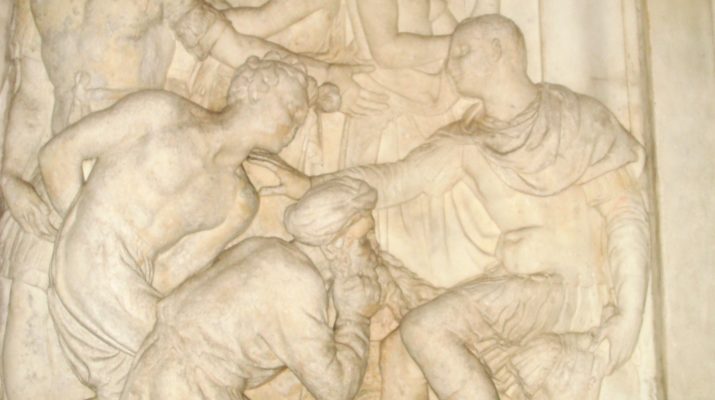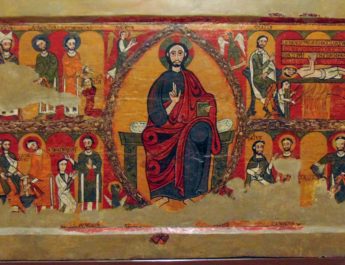James 2:8-13
A Women’s Lectionary 41
8 If you really fulfillA the royalB lawC
A “fulfill” = teleo. From telos (an end, aim, purpose, completion, end goal, consummation, tax; going through the steps to complete a stage or phase and then moving on to the next one). This is to complete, fulfill, accomplish, end.
B “royal” = basilikos. 5x in NT. From basileus (king, emperor, sovereign); probably from basis (step, hence foot; a pace); from baino (to walk, to go). This is royal, something suitable to or otherwise connected to a king. It can also be a royal official, the king’s country, attire, or dignity.
C “law” = nomos. From nemo (to parcel out). Literally, that which is assigned. It can be usage, custom, or law. This word can be used for human or divine law. It can be used specifically for the law of Moses or as a name for the Torah (the first five books of the Bible). Sometimes it is used for scripture as a whole, used of the Gospel, or of any theology. It is also used for the “tradition of the elders,” which would be the oral Torah – the tradition of the laws plus their interpretations as they were passed down over time. We must carefully consider which meaning of “law” is meant when we interpret passages the word is found in.
according to the scripture,D “You shall loveE your neighborF as yourself,” you doG well.H
D “scripture” = graphe. From grapho (to write). This is literally writing, a document. In the New Testament, this is always used for scripture.
E “love” = agapao. Perhaps from agan (much). This is love, longing for, taking pleasure in. It is divine love or human love that echoes divine love.
F “neighbor” = plesion. 17x in NT. From pelas (near). This is near, nearby, or neighboring. As one nearby, it can also refer to a neighbor, a member of one’s country, a Christian, or a friend.
G “do” = poieo. This is to make, do, act, construct, abide, or cause.
H “well” = kalos. From kalos (good, noble, beautiful, correct, or worthy; external signs of goodness like beauty, demonstrations of honorable character, showing moral virtues; a different word, agathos, speaks of intrinsic good). This is nobly, rightly, well-perceived, seen as appealing, morally pleasing, honorably.
9 But if you show partiality,I you commitJ sinK and are convictedL by the law as transgressors.M
I “show partiality” = prosopolempteo. 1x in NT. From prosopolemptes (literally, one who accepts a face, i.e. act with partiality); {from prosopon (face, surface, or front; can imply presence); {from pros (at, towards, with) + ops (eye, face); {from optanomai (to appear, be seen); perhaps from horao (become, seem, appear)}} + lambano (active acceptance/taking of what is available or what has been offered; emphasizes the choice and action of the individual)}. This is to show partiality, to favor someone particularly.
J “commit” = ergazomai. From ergon (work, task, action, employment). This is to work, labor, perform, toil.
K “sin” = hamartia. From hamartano (to miss the mark, do wrong, make a mistake, sin); {from a (not) + meros (a part or share)}. Literally, this means not having one’s share or portion – like not receiving inheritance or what was allotted to you. This word means missing the mark so it is used for guilt, fault, and acts of sin.
L “convicted” = elegcho. 17x in NT. This is to expose, reprove, discipline, convict, or rebuke. It is using convincing evidence to expose a wrong.
M “transgressors” = parabates. Related to “royal” in v8. 5x in NT. From parabaino (literally to go past; to violate, break, or transgress; intentionally stepping across a boundary that one is aware of; to turn aside or depart); {from para (beside, by, in the presence of) + the same as basis (see note B above)}. This is transgressor – someone who intentionally crosses the line.
10 For whoever keepsN the wholeO law but failsP in oneQ point
N “keeps” = tereo. From teros (a guard or a watch that guards keep); perhaps related to theoreo (gazing, beholding, experiencing, discerning; looking at something to analyze it and concentrate on what it means; the root of the word “theatre” in that people concentrate on the action of the play to understand its meaning); from theaomai (to behold, look upon, see, contemplate, visit); from thaomai (to gaze at a spectacle; to look at or contemplate as a spectator; to interpret something in efforts to grasp its significance); from theoros (a spectator or envoy). This is to guard, observe, keep, maintain, or preserve. It can also be used f iguratively for spiritual watchfulness. It is guarding something from being lost or harmed – keeping an eye on it. Contrast the Greek phulasso, which is to guard something so that it doesn’t escape. Also contrast koustodia, which generally denotes a fortress or military presence. This word can mean fulfilling commands, keeping in custody, or maintaining. It can also figuratively mean to remain unmarried.
O “whole” = holos. This is whole, complete, or entire. It is a state where every member is present and functioning in concert. This is the root of the word “whole.”
P “fails” = ptaio. 5x in NT. Perhaps from pipto (to fall literally or figuratively). This is to stumble or cause to stumble. It can also refer to sinning or giving offense or failing.
Q “one” = heis. This is one, a person, only, some.
has becomeR accountableS for allT of it. 11 For the one who said, “You shall not commit adultery,”U also said, “You shall not murder.”V Now if you do not commit adultery but you murder, you have become a transgressor of the law.
R “become” = ginomai. This is to come into being, to happen, become, be born. It can be to emerge from one state or condition to another or is coming into being with the sense of movement or growth.
S “accountable” = enochos. 10x in NT. From enecho (to hold in, ensnare, be angry at); {from en (in, on, at, by, with) + echo (to have, hold, possess)}. This is bound by, liable to, deserving, guilty, subject, in danger of.
T “all” = pas. This is all or every.
U “commit adultery” = moicheuo. 15x in NT. From moichos (adulterer; a man who has been with a married woman; used figuratively of an apostate). This is committing adultery or adultery itself. Used of a man with a married woman or a married man with anyone other than his wife.
V “murder” = phoneuo. 12x in NT. From phoneus (a murderer); from phonos (killing, murder, or slaughter; one of the crimes that Barabbas and Saul are accused of); from pheno (to slay). This is to kill or murder. It is killing on purpose without justification.
12 So speak and so actW as those who are to beX judgedY by the law of liberty.Z
W “act” = poieo. Same as “do” in v8. See note G above.
X “to be” = mello. Perhaps from melo (something that one is worried or concerned about, something one pays attention to or thinks about). Properly, this is ready, about to happen, to intend, delay, or linger. This is just on the point of acting.
Y “judged” = krino. To judge, decide, think good, condemn, determine, pass judgment, stand trial, sue. This is judging whether it is done in court or in a private setting. Properly, it refers to mentally separating or distinguishing an issue – to come to a choice or decision, to judge positively or negatively in seeking what is right or wrong, who is innocent or guilty. It can imply trying, condemning, punishing, or avenging.
Z “liberty” = eleutheria. 11x in NT. From eleutheros (a free person, at liberty, not a slave; properly, unshackled – figuratively, it is one who has the freedom to choose their destiny. Also, it is one who does not have obligation or liability); probably from erchomai (to come or go). This is liberty or freedom. Particularly, it would be release from slavery. It can also refer to moral freedom.
13 For judgmentAA will be without mercyBB to anyone who has shownCC no mercy;DD mercy triumphs overEE judgment.
AA “judgment” = krisis. Related to “judged” in v12. From krino (see note Y above). This is a judging or a sentence. It is often used of God’s judgment, but can also be any accusation or condemnation. This is where the word “crisis” comes from.
BB “without mercy” = anileos. 1x in NT. From aneleos (merciless); {from a (not, without) + eleos (mercy, pity, tender mercy, or compassion; generally understood in action by word or deed)} OR from a (not, without) + hileos (forgiving, merciful, gracious, cheerful as benevolent; a way to say “far be it”); {from hilaos (gracious, benevolent) or from haireomai (to take, choose, or prefer) {probably related to airo (raise, take up, lift, remove)}.. This is merciless or inexorable.
CC “shown” = poieo. Same as “do” in v8. See note G above.
DD “mercy” = eleos. Related to “without mercy” in v13. See note BB above.
EE “triumphs over” = katakauchaomai. 4x in NT. From kata (down, against, according to, throughout) + kauchaomai (literally holding one’s head high – to boast proudly or to glory, joy, exult, rejoice; can be boasting in a positive or negative sense); {perhaps from auchen (neck) OR from aucheo (to boast) + euchomai (to wish, request, pray to God)}. This is to boast over or exult over, to glory, rejoice, triumph over. It is lifting up or boasting over one thing at the expense of something else in a bad way. It can be false superiority or arrogance.
Image credit: “The Clemence of the winning Condottiero with his Prisoners” by Baccio Bandinelli at the Piazza san Lorenzo Square in Florence, 1540.




